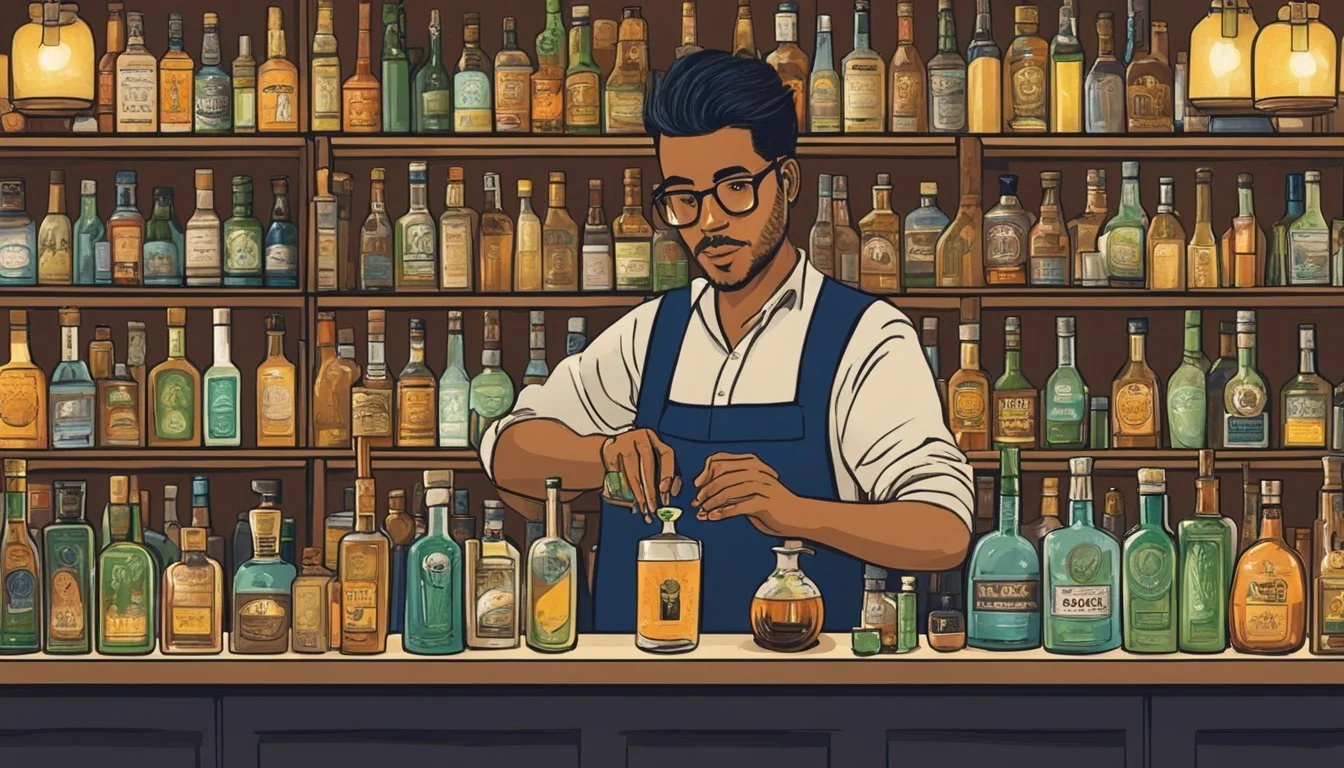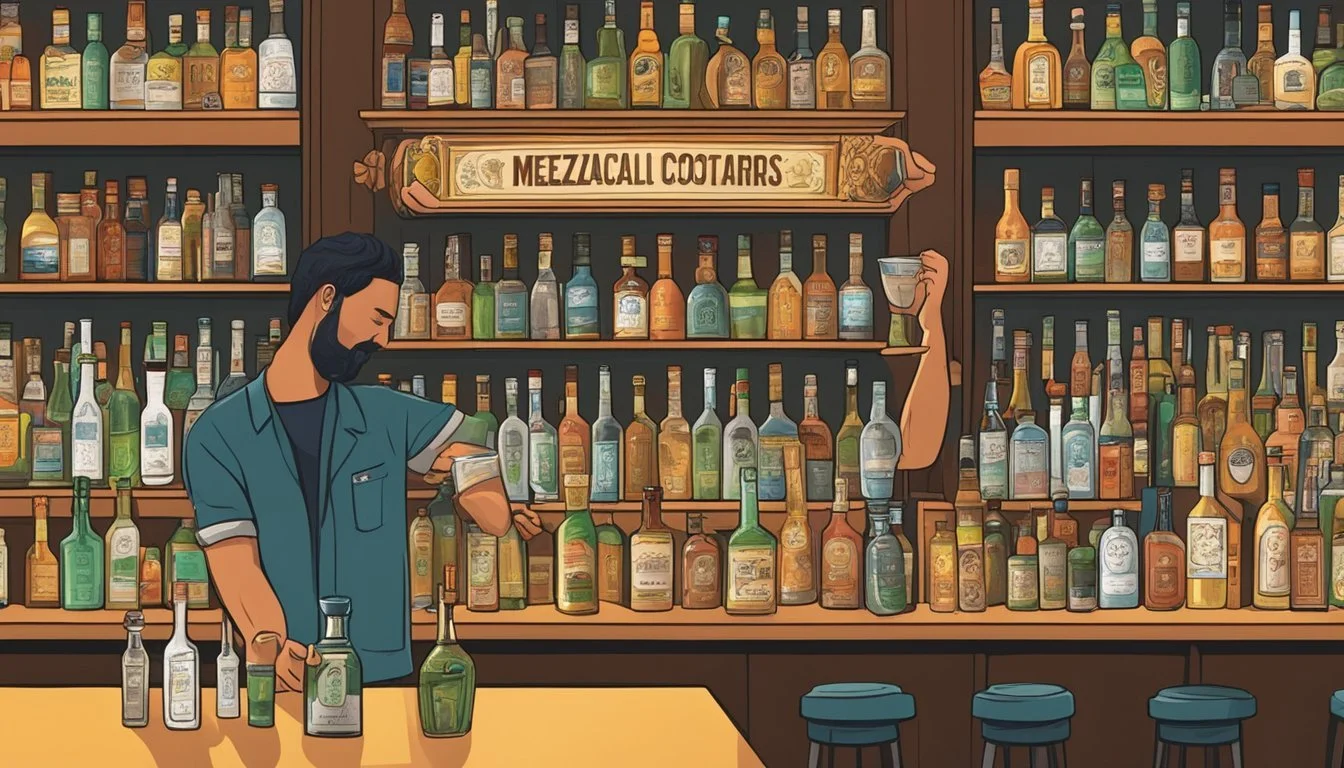The Resurgence of Mezcal in Texas Bars
A Spirit's Rise to Popularity
Mezcal, a traditional Mexican spirit with rich cultural roots, has seen an invigorating rise in popularity within Texas bars. This agave-based liquor, which once lingered in the shadow of its more renowned cousin tequila, is now stepping into the limelight in locales like Austin. The city's enthusiastic embracement of mezcal is evident in the proliferation of specialty mezcal bars and the expanding variety they offer. Establishments such as Las Perlas have become a haven for aficionados, boasting a selection that has grown to over 380 different bottles.
The allure of mezcal lies in its complexity and the artisanal methods of production that have been passed down through generations. Aficionados value the spirit for its diverse flavor profiles, which vary greatly depending on the species of agave used and the region of production. Texas bars are tapping into this appreciation for craftsmanship and tradition, curating experiences that cater to both the mezcal connoisseur and the curious newcomer. The scene is complemented by creative cocktail menus that make use of seasonal ingredients, creating palatable introductions to the spirit.
Contributing to the resurgence is a broader trend towards artisanal and craft spirits, where the story behind the product is as significant as its taste. Mezcal's narrative is rich with heritage, appealing to those seeking authenticity and a deeper connection to their beverages. Bars across Texas are responding to this demand by not only serving mezcal but also educating patrons about its cultural significance and the intricate processes involved in its creation, further solidifying mezcal's growing imprint on the Texan palate.
The History of Mezcal
Mezcal, a distinct agave-based spirit from Mexico, has a rich history deeply rooted in tradition and culture. Originating from the Nahuatl words 'metl' and 'ixcalli,' which translate to 'oven-cooked agave,' mezcal's history can be traced back to approximately 200 AD. Historically, it was a ceremonial beverage, revered by indigenous groups such as the Aztecs.
The core of mezcal production is the maguey plant, a term that refers to a variety of agave species native to Mexico. Although there are over 200 types of agave, mezcal primarily derives from types such as the Espadín (Agave angustifolia), accounting for approximately 90% of mezcal. Other notable agave varieties include Tepeztate, Arroqueño, and even Sotol, although the latter is technically a different distillate made from the Dasylirion plant.
In the state of Oaxaca, the heart of mezcal production, the spirit is traditionally crafted using centuries-old methods. After harvesting, the agave hearts (piñas) are cooked inside earth pits lined with lava rocks, wood, and charcoal before fermentation and distillation in clay or copper pots.
During the Colonial period, Spanish settlers' introduction of new distillation techniques saw traditional mezcal production evolve. Incorporating methods akin to those used in making Spanish brandy led to mezcal’s spread throughout Mexico.
Mezcal's renaissance in contemporary times owes much to its revival in craft distilleries and its appreciation as a complex spirit, drawing aficionados globally. Texas bars, celebrating this resurgence, have come to embrace mezcal, serving an array of mezcals that honor its storied history.
Understanding Mezcal
Mezcal captivates with its complex flavors and rich history, deeply rooted in the traditions of Mexico, now experiencing a resurgence in Texas bars.
Types of Agave and Distinction from Tequila
Mezcal is a traditional Mexican spirit made from agave, which is a diverse genus of succulent plants. In contrast to tequila, which can only be produced using blue agave (Agave tequilana), mezcal can be made from over 30 types of agave, including the notable Tobalá. While tequila production is confined to specific regions of Mexico, mezcal boasts a broader geographical footprint, adding to its variety. Agave varieties like Espadín, Tobalá, and Del Maguey contribute distinctive flavors to artisanal mezcals.
Espadín (Agave angustifolia): Most common agave used for mezcal.
Tobalá (Agave potatorum): Wild and smaller-sized, known for its fine and aromatic mezcal.
Del Maguey (Single Village Mezcal): Brand focusing on unblended artisanal mezcal from different villages.
Traditional Mezcal Production Methods
The production of mezcal remains faithful to traditional methods, which often involve hand-harvesting the agave and cooking the piñas (agave hearts) in earthen pits. This process imparts a unique smoky flavor to the spirit. The cooked agave is then crushed, traditionally using a stone wheel (tahona), fermented in wooden or stone tanks, and distilled in copper or clay stills. This artisanal process supports sustainability by relying on local materials and time-honored methods.
Artisanal Versus Industrial Mezcal
Artisanal mezcals are distinguished by their small-batch production processes that prioritize quality and traditional techniques. Industrial mezcals, however, may utilize modern machinery for efficiency and scalability, which can result in a loss of the unique, handcrafted qualities of the spirit. Consumers often seek out artisanal brands for their authenticity and the preservation of cultural traditions. The growing demand for these mezcals has bolstered their prevalence in bars across Texas, reflecting a deep appreciation for their heritage and individuality.
Artisanal Mezcal: Made in small batches, traditional methods, varied flavors.
Industrial Mezcal: Large-scale production, modern methods, more uniform flavor profiles.
Mezcal's Resurgence in Texas Bars
Mezcal has made a remarkable comeback in a number of Texas cities, with Austin leading the trend. The city's bars and restaurants are increasingly showcasing a vast range of mezcals, offering both locals and visitors a comprehensive look into this spirit's complex flavors.
Growing Popularity in Austin
In Austin, the nation’s first mezcal bar, Las Perlas, expanded from its original Los Angeles location, boasting an impressive selection of 383 bottles. This enthusiasm is evident in the city's vibrant bar scene, where mezcal, once overshadowed by other spirits, now enjoys the spotlight. Bars like Mezcalería Tobalá serve as cultural hotspots, introducing a curated experience with rare mezcals, set within an authentic Mexican cantina atmosphere on weekend nights.
Rise of Mezcal Bars and Restaurants
Austin's array of bars dedicated to mezcal, such as Techo Mezcaleria and Whisler's, reflects the spirit's increased stature within the bar industry. Whisler's, known for its craft cocktails, harbors Mezcalería Tobalá—a mezcaleria named after an agave variety—beckoning guests to enjoy a selection of artisanal mezcals. These establishments, through thoughtful presentation and knowledgeable staff, have become pivotal in educating patrons about mezcal's rich heritage and complex flavors.
Signature Mezcal Cocktails in the Bar Scene
Austin's cocktail bars have embraced mezcal, incorporating it into signature drinks that appeal to adventurous palates. Menus feature mezcal-based concoctions with names hinting at their Mexican origin and the spirit's smoky essence, becoming favorites among those seeking a sophisticated, yet traditional cocktail experience. Bars are not only venues for tasting but also serve as educational platforms, where the journey from agave plant to the finished mezcal bottle is spotlighted, framing mezcal as an integral part of Mexico's cultural export.
Popular Mezcal Destinations in Texas
In a state where the spirit of innovation thrives, Texas has seen a surge in bars elevating mezcal. From specialized mezcalerias to crafted mezcal cocktails, enthusiasts can explore a diversity of flavors and experiences.
Highlighting Austin's Mezcal Hotspots
Austin stands at the forefront of the mezcal wave, housing numerous bars where aficionados and the curious alike can savor this smoky spirit. Mezcalería Tobalá, perched above Whisler's on East 6th Street, offers a cozy ambiance reminiscent of a rural Mexican cantina. Only open Friday and Saturday nights, it's a destination for those seeking an authentic mezcal experience. On Rainey Street, Bar Illegal provides a rustic, clandestine setting, perfect for sipping mezcal. It is carved out of a historic house, paying homage to Mexican heritage. 400 Rabbits, located at South Austin, makes a bold statement with a robust selection of mezcal and invites patrons to enjoy meticulous mezcal cocktails.
Mezcalería Tobalá: Intimate setting with a curated mezcal selection.
Bar Illegal: A hidden gem with a vintage Mexican feel.
400 Rabbits: Creative cocktails and expansive mezcal variety.
La Condesa, celebrated for its modern Mexican cuisine, stands out for its impressive range of mezcal, enhancing dining with perfect pairings. For those intrigued by mezcal's versatility, Clive Bar on Davis Street crafts unique mezcal cocktails. It's a spot where mixology meets tradition.
Noteworthy Mezcal Selections Beyond Austin
While Austin is a hub for mezcal culture, other venues across Texas also offer noteworthy selections. Las Perlas in Dallas entices with an extensive collection of mezcal and hosts educational tastings that delve into its complexities. Advocates for sustainability, they educate patrons on the artisanal process of mezcal production. Suerte in East Austin, nestled on East Sixth Street, is lauded for its marriage of traditional techniques and local ingredients, creating exquisite mezcal cocktails.
Las Perlas: A Dallas staple for mezcal education and variety.
Suerte: Known for creative uses of mezcal in cocktails.
Additionally, establishments like El Naranjo on Rainey Street and Mezcalito's on South Congress, infuse the dining experience with hand-picked mezcal selections. Mama Rabbit in Las Vegas boasts a library of over 500 labels of mezcal and tequila, offering one of the broadest selections for enthusiasts to explore.
The burgeoning interest in mezcal is reflected in the thoughtful curation and presentation found in these locations. From tastings to pairings and innovative mixology, Texas' bars and restaurants are embracing the complexity of mezcal.
Mezcal in Food and Cocktails
Mezcal's distinctive smoky flavor lends itself well to both food pairings and cocktail innovation. Throughout Texas bars, enthusiasts experience mezcal's versatility firsthand in signature dishes and unique drink creations.
The Art of Mezcal Pairings
When it comes to pairing food with mezcal, the spirit's boldness complements a variety of traditional Mexican dishes. Ceviche, a citrus-marinated seafood delicacy, is elevated when sipped with mezcal, as the spirit's smokiness harmonizes with the dish's fresh zest. Similarly, tacos and mole, rich in flavor and often spicy, stand up well against mezcal's robust character. The versatility of mezcal makes it an excellent choice for restaurants to enhance their culinary presentations.
Innovative Mezcal Cocktail Creations
Mezcal's recent rise in popularity has brought forth an array of mezcal cocktails that extend beyond the well-known margarita. Bars are crafting specialty cocktails that highlight mezcal's complex profile. One standout creation is the Oaxaca Old Fashioned, a twist on the classic, using both mezcal and reposado tequila, sweetened with agave nectar.
Mezcal Margarita: A smoky take on the classic cocktail.
Electron: A mixture of mezcal, cinnamon syrup, and lime, offering spicy and earthy notes.
These innovative mezcal cocktails deliver an intriguing experience for those exploring beyond traditional spirits and demonstrate bartenders' creativity in blending mezcal with other flavors.
Cultural Influence and Trends
Mezcal has uniquely positioned itself within Texas bars, intertwining with local Mexican cuisine and reshaping consumption trends through innovative presentations and flavors that cater to a diverse audience.
Mezcal's Role in Contemporary Mexican Cuisine
In Texas, mezcal has become integral to the modern Mexican culinary experience. Restaurants offer pairs of mezcal with dishes, using the spirit's smoky notes to complement the robust flavors of traditional Mexican fare. This partnership elevates the complexity in flavors and attributes to mezcal's status as both a traditional and trendy beverage choice. "Rare mezcal" selections are at times featured, offering patrons the opportunity to savor unique and less commonly found varieties of mezcal.
Trends and Innovations in Mezcal Consumption
Texan bars have embraced mezcal's versatility, introducing it in a range of contexts from "fun and flirty" cocktails to "big and brash" neat pours that showcase the spirit's bold essence. Innovative mixology has led to mezcal being a foundation for creative concoctions that intrigue even the "mild mannered" drinkers, aiming to broaden the appeal of this spirit beyond its traditional consumer base. To meet the demand for mezcal, bar menus frequently highlight a selection of mezcal-based cocktails, often infusing local ingredients and flavors, thus reinforcing the cultural blend and ongoing innovation within the mezcal sphere.
Education and Experience
As mezcal continues to captivate the palate of Texans, bars across the state are establishing innovative ways to educate patrons. They offer a comprehensive experience through educational events, tastings, and authentic atmospheric encounters.
Educational Events and Tours
Educational events often occur in cities like Austin, where enthusiasts can join events at venues such as Total Wine & More. Here, attendees can learn about mezcal's diverse agave varietals and traditional production techniques that honor the spirit's rich heritage. These events may feature tours that navigate through the historical and cultural significance of mezcal in Mexico and its influence in Texas.
Mezcal Tastings and Appreciation
At tastings, participants have the chance to appreciate the intricacies of different mezcals. Events, like the ones hosted by Erstwhile Mezcal in Austin, engage both novices and connoisseurs. They guide them through a curated selection of mezcal to exhibit the variety of flavors and aromas. Patrons can discern the subtle differences between bottles and learn the craftsmanship behind each.
Locations for Mezcal Tastings in Texas:
Austin: Mezcaleria Tobalá, Second Bar + Kitchen
Houston: Mijo’s Mezcal Bar
Authentic Experience at Mezcal Bars
A true mezcal bar provides an immersive experience that's reflective of its Mexican origins. Bars like Las Perlas in Austin boasts a staggering selection, furthering one's education through every sip. Visitors are often treated to a rustic and intimate setting that echoes a rural Mexican cantina, elevating their understanding of mezcal culture as they socialize and savor the spirit.
Mezcal Beyond Texas
While Texas, particularly Austin, has experienced a notable resurgence of mezcal, this spirit's revival isn't confined to its borders. Mezcal's smoky allure is capturing hearts in cities across the United States and internationally, signaling a broader trend.
Mezcal's Presence in Other Major Cities
In Denver, mezcal has found its way into the city's cocktail scene with dedicated bars and mezcal-centric menus offering a host of mezcalitos—a testament to their evolving drink culture. Phoenix, meanwhile, beckons aficionados with its own growing selection of mezcal bars, reflecting the city's proximity to the spirit's cultural roots.
San Francisco and New York City have both seen an uptick in mezcal bars, ranging from specialized nooks that offer curated mezcal flights to more expansive venues boasting extensive collections. These urban hotspots are particularly influential, often setting trends that ripple out to other regions.
Las Vegas is not to be outdone, with its vibrant nightlife embracing mezcal as a sophisticated addition to its luxurious entertainment offerings. Cocktail menus are increasingly showcasing mezcales that cater to both the curious novice and the discerning sipper.
International Influence and Expansion
Beyond American cities, mezcal has begun to make waves internationally. As this agave-based spirit breaks free from the shadow of its relative, tequila, it finds appreciation in global markets. Bars dedicated to mezcal are cropping up in cities like London, Tokyo, and beyond, where international patrons cultivate a taste for its rich, complex flavors.
These establishments not only serve mezcal but also educate consumers about the spirit's heritage and varieties. The international expansion has helped mezcal grow into a globally recognized spirit appreciated for its unique taste and artisanal production methods.
Sustainability and Future of Mezcal
The mezcal industry faces unique sustainability challenges as its popularity surges in Texas bars and beyond. Mezcal, a spirit derived from various species of agave plants, has deep roots in Mexican culture. Unlike tequila, which primarily uses cultivated blue agave, artisanal mezcals often rely on wild agave species. This aspect raises concerns about the long-term viability of these wild populations.
Agave Life Cycle: Agaves can take anywhere from 7 to 30 years to mature, depending on the species. Overharvesting, particularly of wild agave, can threaten this slow-growing plant's sustainability.
The Texas sotol plant, or Dasylirion texanum, offers an example of successful sustainable management practices. Producers in the region, like the Desert Door Distillery, harvest these plants in 12-year cycles, allowing for regrowth and minimal environmental impact.
Artisanal vs. Industrial: Artisanal producers typically engage in more sustainable practices than industrial-scale distilleries, maintaining traditional methods passed down through generations. They are often more conscientious of their environmental footprint, though smaller scale production can sometimes lead to resource scarcity.
In Victoria and other regions, efforts to cultivate a mezcal culture that respects sustainability are gaining traction. It involves educating consumers and the industry on the importance of preserving agave diversity and supporting producers who adhere to sustainable harvesting.
Mezcal's Future Prospects:
Encouraging sustainable farming techniques
Supporting smaller, artisanal producers
Educating consumers on mezcal's cultural and environmental importance
Moving forward, ensuring mezcal's sustainability will likely involve a combination of innovative farming practices, protection of wild agave species, and a robust regulatory framework. As the spirit enjoys its resurgence, industry stakeholders are aware that the future of mezcal depends on their commitment to balance growth with environmental responsibility.
Conclusion
Mezcal, the distilled spirit with deep roots in Mexican culture, has experienced a significant resurgence in Texas bars. Characterized by its artisanal production methods and distinct flavor profiles, mezcal has captivated the taste of American consumers in various cities, including Austin. The spirit's growth is reflected in the increasing number of mezcal bars and the expanding variety of available mezcal brands.
In recent years, a blend of intrigue and appreciation for traditional craftsmanship has elevated mezcal's status from an elusive spirit to a celebrated beverage choice in the Lone Star State. Bars have played a pivotal role in enlightening patrons about mezcal's complexity and heritage. The adoption of mezcal into cocktail menus has facilitated its rise in popularity, making it a staple in the thriving Texas bar scene.
Educational efforts have served to enhance understanding and foster a sophisticated drinking culture around mezcal. By hosting tastings and showcasing small-batch producers, bars are supporting a sustainable growth model that benefits both local establishments and rural Mexican communities where mezcal originates.
The market's responsiveness to mezcal suggests that this spirit's presence is more than a fleeting trend. Texas has shown a remarkable embrace of mezcal, indicating that it will continue to be an integral part of the state's diverse and evolving beverage landscape.









